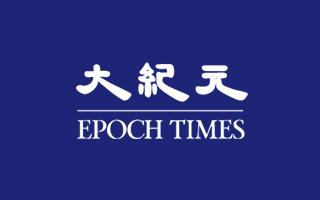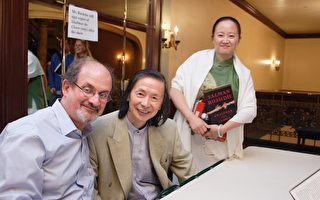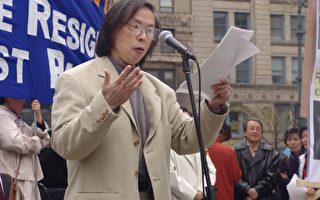【大纪元10月29日讯】研讨会主题:Reclaiming Huang Xiang: Poetry, Survival and Community
中太平洋地区亚洲研究协会
34届年会-10月28日-30日
由匹兹堡大学国际系亚洲研究中心主持
MID-ATLANTIC REGION
ASSOCIATION FOR ASIAN STUDIES
34th Annual Meeting – 28, 29, 30 October 2005
Hosted by the Asian Studies Center – University Center for International Studies
University of Pittsburgh
Panel Presentations
Asias: Prohibited, Permitted, Past, Possible
Exploring the Lines Between the Prohibited and the Possible
时间: 10月29日,周六– 8:45 to 11:15 am
研讨会主题:PANEL 1 – Reclaiming Huang Xiang: Poetry, Survival and Community
地点:4500 Posvar Hall ( Wesley W. Posvar Hall, University of Pittsburgh )
主持人Chair: Jiayan Mi, The College of New Jersey
演讲论文:
1, Notes from the Censorland:Tactics and Engagement
自由写作的坚守
Uphold the Fort for Writing Freedom
黄翔,独立诗人Huang Xiang, Independent Poet
2, Huang Xiang’s Poetry Identity in Translation: the Global Response
Jeffrey Kinkley, 圣‧约翰大学教授St. John’s University
3, A Flight Over the Dream Nest: Local Dwellings in Huang’s Poetry
Xinmin Liu, 匹兹堡大学教授University of Pittsburgh
4, Anti-lines: Orality,Vocality and Embodiment in Huang’s Poetry
Jiayan Mi,新泽西大学教授The College of New Jersey
论文讨论人Discussant: Jeffrey Kinkley, St. John’s University
Welcome from The MAR/AAS President Institutional Members
Bucknell University Temple University
Community College of Philadelphia Towson State University
Georgetown University University of Delaware
The George Washington University University of Pennsylvania
Lincoln University University of Pittsburgh
Pennsylvania State University World Affairs Council
Rutgers University
If you have questions please contact Dr. Jordan at 412.648.7763 or jordanb@ucis.pitt.edu.
You may visit the website for details at:
网址:ccat.sas.upenn.edu/maraas/program2005.pdf
附:
自由写作的坚守
黄 翔
谈个人自由写作,不能不联系到地下秘密写作状况,那是一度在中国大陆、特别是文化大革命中出现的一种特异文化现象。这种现象不仅出现在文化大革命时期,而是从1949年以后就一直存在着,它与官方文化一隐一显地同时并存。这是两种性质截然相异的文化现象,但毫无疑问,较之极权社会体制下的官方文学,作为地下隐秘状态的“自由写作”或“地下文学”所体现的是一个民族和一个时代真实的人文命脉和精神景观。
官方文学与来自民间的地下文学,一个是明流、一个是地下河;一个仰仗于权力意志、一个寻求的是自由表达;一个备受人为推崇、一个遭受高压、充满危险甚至潜伏着杀身之祸。时至今日,中国大陆地下文学已出现多种名称的命名,如“潜流文学”、“隐态写作”、“潜在写作”,但其“地下”的实质不变。包括现在中国大陆的“网络文学”,虽然已有相对自由的表达空间,但仍然时时受到网警的严格检查、控制、骚扰和追踪,并未真正享有完全的公开化、地面化和合法化的表达权利,写作者仍然处于另一种意义上的“地下”的不安全状态。
地下文学之为“地下”,不决定于这种非官方写作的时间有多早、持续的时间有多长,而决定于其自由精神特征及其表达。这里的“自由”,是针对思想文化领域的“专制”而言。因为从事这种地下状态的秘密写作者,表达的不仅是个人的文字意趣,而是对“写作的自由”的追求,为此,他必须承受风险和可能的致命打击,个人人身安全受到威胁。同时,这种“自由”是指精神创造的自由,它必须具有超越意识,其创作成果与同时代的一般水平,不是处于同一层次上,而具有超前的精神价值。在特定的历史条件下,它无可回避地必然承担起对人权的关注和维护,并且注定对极权社会体制构成挑战!
在这个意义上来说,地下文学创作时间的早晚和持续时间的长短,并不必然地具有地下文学本身的人文精神的历史和现实的饱满含量。
自由写作或地下文学,主要是而且首先是以个体的形式而非以群体的形式出现。“群体”或有“组织”性的“自由写作”在极权主义社会制度下前所未闻、并且注定覆灭。从某种角度来看,公开写作之外的隐蔽写作本质上是一种无奈,它纯属与他人无涉的个人行为。但个人作为“个体”的存在,必然经由精神而波及和影响到更多的人,这样也就有可能形成某种松散性的自由组合。如文化大革命时期,贵州出现的持续十年之久的地下文学现象,就是这样一种“组合”而非“组织”,它的主要表现形式就是“地下沙龙聚会”、“地下诗歌朗诵”和自印油印诗集,直至最后发展到率先公开在北京和贵阳两地发行民刊,影响所及包括海内外。
这就是具有“中国社会主义特色”的“自由写作”或“地下文学”的历史真像!
这种文化现象的出现和存在,决定于多种因素:首先,是写作者个人的勇气和对理念与良知的坚守;其次,必须具有生长和传播“异端思想”的一方精神土壤,而远离皇城、地处边远的贵州却正是这样的荒蛮之地;第三是作品本身所具备的生命力,经得起时间的淘汰而免于自生自灭。“自由写作”或“地下文学”是一个时代的历史见证;而作为见证的作品其真实性及其产生的年代也必须经由同时代人见证和认证。相信这样的作品的产生尽管是一种个别现象却不是绝对孤立的现象,它必然直接和间接同周围的人和环境发生这样那样的关联。但在专制社会条件下,这类秘密写作却不带普遍性、也不可能普遍存在,它只能是个别的、甚至孤绝的。能够以“群落”形式普遍存在的文化现象已失去了真正意义上的“地下”性,也不再具有某种可能的伤害和危险性;其成员一般不会由此而承受压力、遭受迫害并失去自由。
并不是所有的秘密写作和地下文学都具有免于时间冲淘的生命力的。能逃避时间和历史的沉湮而幸存的真正的地下文学作品,其幸存于世决非得益于夹缝中求存、巧妙周旋或与权势者互为默契、变相同谋。也就是说,它的“幸存”不是一种谋略或策略性的操作的结果,也不是精神羸弱和疲软者的幸运,而是并且只能是面对暴虐的个人的精神坚守、是作品的精神品质及其自身的内在生命力,和作品中巍然独存的反叛和抗争的那份磨不去的自觉。心性萎缩和举阳不起者,其精神生命形态永远拱不破覆盖的土层。他们不仅承受不了外力对自身的摧毁,也难逃“自身湮灭自身”的厄运!一般来说在强权和暴力下,自由写作注定难逃精神湮灭的悲剧;而特殊情况下,其中终能避免湮灭而得以幸存的地下文学作品,其精神生命形体将日趋显露、其内在饱和的能量将持续释放。并且它必然由边缘化走向自身的确立而最终完成自己。这样的特例之所以成为可能,唯一的依据就是别无选择的“精神坚守”和绝不放弃精神抗争!在“天网恢恢、疏而不漏”的禁锢下,除非统治者出于策略考虑而网开一面,不存在给任何人以任何“漏网”的侥幸和可能的机会。
我是1958年开始发表作品的,1959年为追求生命自由和写作自由被第一次投入监狱。也就是从那个时候起,我的作品被禁止发表;而也正是上个世纪五十年代末我在狱中开始了我的处于绝密状态的地下写作。这种写作长期是孤独的、绝密的、不能同人公开交流的。1962年获释后我开始流浪,并在流浪途中继续写诗。1963年我流落到一个遥远山区的茶场,那时候曾与一群喜欢文学和写作的文学青年交往,他们是来自贵州遵义的熊庆棠、朱炎、苏小乙等人,我们常有流动性的文学小沙龙式的聚会,为此,“四清”运动和“文化大革命”运动中,被工作组秘密打成“现行反革命集团”。直到十年后的1968年,我回到贵州省的省城贵阳市与诗人哑默等人结识,以“北斗七星”为主体的一群人,才开始在他家的“资产阶级”庭园中集群聚会,秘密朗诵我的诗歌《白骨》、《野兽》、《火炬之歌》、《我看见一场战争》、《倒下的偶像》、《诗人的家居》等作品,贵州地下文学也由此以松散的群体形式出现,这就是中国当代民间自发的“民主墙运动”发生前,贵州著名的地下文学沙龙“野鸭沙龙”。那时候大家开始抄写或油印一些诗在聚会时传阅,有时甚至汇聚成册,这就是最早以手抄或油印形式刊发的诗集,我的有诗歌《野兽的沉思》、诗论《留在星球上的札记》,哑默的有诗歌《苦行者》和随笔《檬子树下的笔记》,但这些文字都不能公开见诸于人的。真正公开的自由民刊的出现是1978年10月11日,以大字报专刊和油印民刊出现在北京的《启蒙》,那是民主墙运动的第一份自由民刊,也是极权体制下的中国第一份在北京和贵阳两地公开传播和散发的民间自发刊物。在同一时期出现的民刊还有《中国人权同盟》、《探索》、《四五论坛》、《北京之春》、《沃土》、《今天》等,这些民刊在当代中国历史上至今湮灭无闻,唯有“纯文学”刊物《今天》受到“有选择”的容纳。其他民刊不仅全部被封杀,而且主要成员全部被捕。同期有过一定影响的还有从《启蒙》分裂出去的《解冻》,和出现在贵州境内的《使命》、《百花》、《野草》、《大乌蒙》、《诗魂》、《状态》、面向全国的大学生民刊《崛起的一代》、大型诗报《中国诗歌天体星团》和至今活跃在北京的诗歌民刊《大骚动》。值得一提的还有为推动“中国文艺复兴运动”而一度出现在中国大西南贵州的“诗歌讲座”和“文学沙龙”,和历时久远(从1979年延续至今)却未受到社会足够注意的四川民间诗刊《野草》,其主要人物有陈墨、蔡楚、邓垦、白水等人。我这里强调的是文学的非官方立场,也即它的自始至终的民间性。这样的民间诗歌群落有早已发掘并广为人知的“白洋淀诗群”,而贵州的《启蒙》、《崛起的一代》、《天体星团》和同处大西南四川的《野草》至今未受到专制者容忍。
我的藉贯是湖南人,但长期生活在远离北京中心的外省贵州。那儿山高皇帝远,没有城墙和皇宫,只有巍峨起伏的崇山峻岭和汹涌呼啸的瀑布和河流,赋予这里人一种天不怕、地不怕、敢把皇帝拉下马的独立生命意志和自由精神。“自由写作”和“地下文学”的存在,不仅仅决定于写作者的超前的独立思考、个人的才华和气质,在那种特定的历史条件下,首先决定于一个人的勇气,包括文字书写和综合肢体语言与行为方式的立体书写的勇气。这是躲在书斋里不敢面对“大街、广场和人群”的儒生和懦夫不可理喻的。而这种特殊意义的写作和文学现象之所以在高压下避免了全军覆没,不仅决定于作品的精神含量及其历史和现实的双重价值,更决定于写作者一次又一次“不甘湮灭”的自我拯救和勇敢冲击,并使其“精神形体”终于“浮出水面”或“冒出土层”。就我个人而言,一生创作从未得以在大陆出版、并且一次又一次被抄搜,幸存尚有数百万字。一生六次为写作被投入监狱,失去自由先后长达十二年,每次都无不与追求生命自由与写作自由相联系。那个年代类似我这样出身“反动家庭”却公开坚持精神反叛者还为数不多,而时代发展到现在,勇于面对公众自由表达的独立作家和诗人已经成批成批地出现,这样的名字可以列举出一长串,其中不少人不仅具有超人的勇气,而且才华横溢、充满艺术气质并且硕果累累。在此,我要为年青一代“自由写作”的坚守者和维护者大声欢呼!我满怀期望地坚信,这些人必是中国当代文学史、思想史和社会史的重新书写者、也是它们的改写者,他们的名字将因各自卓越的成就而进入中国未来真正的社会、思想和文学史册!!!
2005年7月6日于匹兹堡“诗人之家—梦巢”
Uphold the Fort for Writing Freedom
Huang Xiang
When addressing an individual’s freedom to write, one is compelled to relate it with the state of writing in anonymity and underground. That used to be a very abnormal cultural condition, which emerged in mainland China, especially during its Cultural Revolution. This particular condition not only existed during the entire Cultural Revolution era, but had lasted all along ever since 1949, coexisting with the CCP-led culture as the covert versus the overt. These two cultural conditions fundamentally are directly opposed, yet beyond any doubt, “writing freedom” or “underground literature,” in contrast to the official literature under an authoritarian regime, stands for the humanistic lifeline and intellectual radiance of any given nation in any given historical period.
Underground literature, originated from the popular and folk, differs from official literature in the following manners: one is the undercurrent, the other the surface flow; one seeks freedom of expression, the other depends on the will of those in power; one faces repression, banishment and even execution, the other enjoys favor and esteem. In today’s mainland China, underground literature has assumed diverse guises and forms, they are called “undercurrent literature” “invisible writing” and “latent writing.” Whatever the form, their essence of being “underground” remains unchanged. This applies to the case of “internet literature” currently available in mainland China. Even as it reaches a relatively freer and wider realm, it is still subject to severe censorship, control, harassment and investigation by China’s internet cops, and never truly attained rights of expression that should be completely public, above-ground and legal. Writers of such literature are still bogged in an insecure zone, which remains “underground” in another sense.
What makes underground literature “underground” is not determined by how long ago the unofficial writing started, or how long it has sustained itself, but by the spirit of freedom it carries and the expression it offers. Here “freedom” is being underscored in contrast to “tyranny” ruling over realms of thought and culture; as the anonymous writers who remain “underground” in order, not to engage in linguistic wit or pleasure for personal satisfaction, but to pursue “freedom to write.” For that purpose, the individual is bound to face risks and possible blows that may threaten the individual’s safety. In the meantime, “freedom” also refers to freedom in intellectual and spiritual creation, which must possess a keen forward-looking sense. Rather than being the average and mediocre work of creation of the same era, it must surge ahead with its spiritual values. Under any given historical conditions, it cannot but be obligated to respect and protect human rights, and it will invariably pose a challenge to any totalitarian social system!
Insofar as this is concerned, whether underground literature started early or late, or whether it has sustained briefly or at length does not necessarily go to prove the fullness of history and reality in realizing its humanistic spirit.
Writing freedom or underground literature emerges, mostly and primarily, in the form of an individual rather than a collective. Any “collectively” or “coordinately” engaged “writing for freedom” has never existed under a totalitarian social system. It is always doomed. Viewed from another angle, writing undercover outside the boundaries of writing in public is fundamentally a hopeless choice, and should be regarded as individual conduct independent of any one else. However, an individual writer exists as an individual “entity,” thus he/she inevitably exerts spiritual and intellectual influence over other fellow human beings. Under such circumstances, it is possible for them to form a loose-fitting freely organized assemblage. A case in point is the underground literature that lasted over a decade in Guizhou during the Cultural Revolution, which is “assembled” rather than “organized.” It chiefly realized itself the form of “underground salons” “underground recitation of poetry” and self-printed volumes of poetry, and expanded its ranks till it could eventually take the lead in publishing them in non-official journals in Beijing and Guiyang, which had attracted readership and spread its influence both at home and overseas.
This is the true historical nature of “writing freedom” or “underground literature” with “Chinese socialist characteristics”!
The appearance and existence of such cultural phenomena is determined by many elements: first, by the writer’s personal courage and the steadfastness of his or her ideas and conscience; secondly, there must be the spiritual environment in which the “heterodox thought” can grow and be disseminated—and Guizhou, at the periphery and far from the imperial city, was just such a wild and uncultivated place; thirdly, there is the vitality of the works themselves, by which they withstand the test of time instead of withering of themselves. “Writing freedom” or “underground literature” is a historical witness to an era; and the truthfulness of a work of witness and the age that produced it must also pass through the eyewitness and authentication of people of the same era. I believe that even if the production of this kind of work is an extraordinary phenomenon, it is not wholly isolated, for it will necessarily directly and indirectly link up in various ways with the surrounding people and environment. But in an autocratic society, this sort of secret writing will not be widely known and it cannot exist everywhere, it can only be sporadic, even isolationist. Cultural phenomena that can exist everywhere as if in a “community” have already lost their “underground” character in the true sense, nor do they have any more a certain power to wound, or to endanger; the constituent members generally cannot take the pressure or withstand persecution and loss of freedom.
By no means all secret writing and underground literature have the vitality to withstand the eroding test of time. A true work of underground literature that can avoid the oblivion of time and history does not survive by clever adaptation while hiding out in the cracks and fissures, or tacit cooperation and disguised collaboration with the authorities. That is to say, its “fortunate survival” is not the result of astute or strategic manipulation, nor the good fortune of the spiritually enervated and the weak, but rather it comes from, and only can come from, personal spiritual steadfastness in the face of tyranny, the work’s spiritual caliber and intrinsic internal vitality, and lofty, unique, rebellious and resistant consciousness in the work that cannot be worn away. The form of the spiritual life of those who are temperamentally listless and “can’t get it up” will never be able to push up through the earth’s crust. Not only can they not endure being smashed by external forces, they will have trouble avoiding the misfortune of “self-destruction.” Generally, when subjected to strong-arming and violence, free expression is destined for the tragedy of spiritual destruction; under special circumstances, for underground literary works so fortunate as to survive and avoid annihilation, the form of their spiritual life will gradually be revealed, and their internally satiated capabilities will continue to be released. Moreover, they will necessarily proceed from marginalization to standing on their own, and final completion. The sole reason these special exceptions can exist is a “spiritual steadfastness” for which there is no alternative and a spiritual resistance that is never abandoned! Under the confines of a situation in which “the net of Heaven has a large mesh, but it lets nothing through,” unless the rulers open the net for tactical reasons, they do not give anyone an opportunity to “slip through the net.”
I started publishing my works in 1958. In 1959, I was put in jail for the first time for pursuing spiritual freedom and writing freedom. And it was starting from then that my writings were prohibited for publication. It was also in the late fifties that I started the journey of my underground writing under absolute secret condition in the prison house. This kind of writing was for a long time often very lonely, secretive, and unable to exchange with other people openly. In 1962 after my release, I started to drift around, and I continued writing poems along the way. In 1963, I roamed to a tea plantation in a remote mountain area, where I got acquainted with a group of young people who loved both literature and literary writings. Of the group, they were Xiong Qingtang, Zhuyan, Su Xiaoyi, and others who came from Zunyi, Guizhou province. We often had irregular small salon gatherings to discuss literature. As a result, during “the Four Clean-ups Movement” and the Cultural Revolution, we were condemned unlawfully as “the presently anti-revolutionary group” by the official work team. It was only a decade later until 1968 that I returned to Guiyang, the capital of Guizhou province, and corroborated with Ya Mo and a group of other poets who formed “the Seven Stars of the Big Dipper.” From then, we started to gather collectively at Ya Mo’s bourgeoisie-style courtyard to clandestinely read aloud my poems such as “White Bones,” “The Wild Beast,” “Song of the Torches,” “I See a War,” “Fallen Idol,” and “Poet’s Dwelling-place.” From there, the underground literature in Guizhou was irregularly and collectively sprouting out, leading to the establishment of the “Wild Duck Salon,” a well-known underground literary salon in Guizhou. In terms of timing, this salon started up before China’s most populist “Democracy Wall Movement” in Beijing.
It was then that everyone started to copy or mimeograph these poems and to circulate them during the gatherings, sometimes even making them into printed volumes. These were the earliest collections of poems produced by hand copy or mimeograph; volumes that were unable to get published openly include my poem collection: Meditations of a Beast, my essays on poetry, Notes Left on a Star,” Ya Mo’s poem collection The Ascetics and his essays Notes under the Sub Tree. It was not until October 11, 1978 that the truly openly published unofficial periodical Enlightenment came into being in Beijing. Published in the form of big posters and mimeographed periodicals, Enlightenment was the first unofficial periodical for freedom from the “Democracy Wall Movement” as well as the first unofficial self-published periodical under the autocratic rule openly spreading and circulating in both Beijing and Guizhou. Other unofficial periodicals that appeared at the same time include China Human Rights League, Exploration, April 5 Forum, Beijing Spring, Fertile Soil, Today, and others. However, all of these publications nowadays are obliterated and thus unknown in modern history, except for the “pure literature” journal Today, which received some “selective” tolerance. Other unofficial periodicals were not only all banned, but their key members were arrested. Meanwhile, some other influential periodicals include The Thaw, which was a subbranch of Enlightenment, Guizhou-based periodicals The Mission, Hundred flowers, Wild Grass, Big Wu Men, Soul of Poetry, and Condition, the unofficial periodical for nation-wide college students Rising Generation, the large-scale poetry newspaper The Star Cluster of the Galaxy of Chinese Poetry, and the still active Beijing-based Big Turbulence. In addition, worthy of mentioning are the “poetry lectures,” “literary salons” that once appeared in China’s southwest Guizhou, and the long-lasting (continues from 1979 until today) but often ignored Sichuan-based unofficial poetry journal Wild Grass (its key members include Chen Mo, Cai Chu, Deng Ken, Bai Shui, and others), they all have contributed to “China’s Renaissance Movement” in the 1980s. What I want to emphasize here is the unofficial positions of literature, namely its folk nature from beginning to end. Although some of folk poetry groups have been excavated and were widely known like “the Baiyang Marsh Poetry Group,” the Guizhou-based groups like Enlightenment, Rising Generation, Star Cluster of the Celestial Body, and the Sichuan-based Wild Grass have not until now received any tolerance from the despots.
I am a native of Hunan, but I grew up in Guizhou, which is far from the capital city of Beijing. As Guizhou is far from the rule of the emperors, and there are no city walls and royal palace, but just unsurpassable high mountains ridges, turbulent waterfalls and rivers, people here are endowed with independent will power of life and free spirit that dare to defy the heaven, question the earth and challenge the emperor. The existence of “writing freedom” and “underground literature” not only dictates the writer’s independent thinking ahead of her/his time, the writer’s individual talent and unique personality, but most of all, under that particular historical conditions, also dictates this writer’s personal courage, including the courage of creating the three-dimensional writing that combines linguistic writings with the body language and actionism. This is unthinkable for those Confucian scholars and cowards who choose to hide in their study but dare not face “the boulevards, the squares and the crowds.” This kind of writing and literary phenomenon possesses special significance because they are not to be entirely destroyed by the high pressure of official ideology. More importantly, this courage for three-dimensional writing will not only determine literary works’ spiritual quality and its dual value of reality and history, but will more determine writer’s voluntary self-redemption and courageous engagement that refuse to be succumbed and annihilated, ultimately leading to the resurgence of the “spiritual body.”
Like myself, none of my works have even been published in mainland China, instead they have again and again been confiscated; fortunately manuscripts with several million words still survived. I have been incarcerated for six times, and lost my freedom as long as twelve years, all because of my pursuit of spiritual freedom and writing freedom. I still have not given up. During the Cultural Revolution era, there weren’t many of people like me around who was born in a “reactionary family” but openly upheld the rebellious spirit against the regime. However, nowadays, there is a coalition of self-proclaimed freelancers who boldly turn to the public for the freedom of speech. I can make a long list of their names. Of them, there are quite a number of people who have made admirable achievements with their superb courage, unusual talents and artistic sensibility. Their exceptional courage and passion have broken down a lot of barriers that lay before them. Therefore, I want to hail the younger generation for their upholding and safeguarding of “freedom writing.” I sincerely believe that these people are the ones who will surely rewrite and revise the history of contemporary Chinese literature, intellectual thoughts and society. For their outstanding achievements, their names will go down in the true history of future China.
(Cotranslated by Ximin Liu, Jeffrey Kinkley and Jiayan Mi)
@(http://www.dajiyuan.com)




